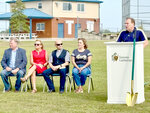



Around 50 people attended a groundbreaking ceremony held Aug. 30 on the Saxony High School campus in Jackson to celebrate the construction of a new Agriculture Science Multipurpose Building. More than 230 students also attended the ceremony.
The event's speakers included the Rev. Paul Short, assistant pastor at Trinity Lutheran Church in Cape Girardeau; District 146 State Rep. Barry Hovis; Debbie Hawkins, representing Congressman Jason Smith; Melisa (Missy) Adams, assistant principal; and Mark Ruark, principal.
Before leading the opening prayer, Rev. Short — who served at the church where the school started 25 years ago — said, “In the year 2000, Saxony High School began at St. Andrew Lutheran Church in Cape Girardeau, Mo. If we have our numbers right, there were seven students that made up the student body. The graduating class had two graduating students four years later. How incredible to see where we are today with all the faculty and staff and 236 students.
“Our Lord has been part of agriculture from creation. He created the crops. And, by the way, what's the oldest occupation? Farming is the oldest occupation. We had to have food in order to eat. And the farmers, from the very beginning, provide that food. So, it's very fitting that a high school like Saxony Lutheran High School has a program, has the instruction and has a facility for agriculture.”
State Rep. Hovis was the next speaker to address the crowd.
“I grew up on a small farm,” he said. “Agriculture was so important. By the age of eight, I was milking a cow every morning. And when we grew up, I didn't even know what homogenized milk was. We always drank raw milk, [we] didn't know any different. Agriculture is so important. It's the number one commodity in the state of Missouri. People sometimes forget that, without agriculture, Missouri would not be the state it is today. We help feed not only the United States, but we help feed the world. So, I'm hoping that from what's heard today, what's going to be anticipated in the future, and what we can use as we go into the future, to make a difference in the state of Missouri. A side note: I spoke with a group at a very big corporation. I won't say their name, but they are making projections now on what it's going to take to feed the world as we go into the future.
“At our consistent rates of population growth, over the next 75 to 100 years, the two biggest things that will be a challenge for our herd is going to be food and water. And right now, they're making those plans to figure out how they can raise enough food and have enough clean water to be able to give that to the population of this world. I'm hoping that the young leaders that we have here today are going to be able to develop the sciences and the techniques that will make it possible for them to be successful and also be able to be successful in this world.”
Mrs. Hawkins spoke about the importance of agriculture as the foundation for Congressman Jason Smith’s life.
Congressman Jason Smith started with politics doing his FFA project,” she said. “So, if he can go about his FFA project as a young, strong, and standing-up guy and become chairman of the most powerful community in all of Congress, I know what you can do.”
Concluding the program, Principal Ruark said, “It’s a long time coming for this to become a realization. Saxony became the first and only private school in the state of Missouri to offer an agricultural science and FFA program in the school year 2014-2015. Our Ag science program has prospered over the past 10 years despite the lack of adequate facilities. This was addressed first in our strategic plan in 2016, in which the commitment was made to raise the funds for a building expansion, including providing facilities for our agricultural science program, additional classroom space, a secondary gymnasium, and a performing arts facility.
“We embarked on a capital campaign in December of 2017 to raise the necessary funds to move forward with this expansion. While there have been ups and downs, a pandemic, supply chain issues, and increased building costs, we are thrilled to be here today, knowing that we are breaking ground. Thanks to the generous donations, this fully funded Phase I project will serve our agricultural science program, the arts, and athletics. It is truly a multi-purpose facility. Let me say that again. It's already fully funded. The school will not be going into debt to build this building.”
Following the groundbreaking ceremony, Assistant Principal Melisa Adams invited everyone present to attend a reception at the school.